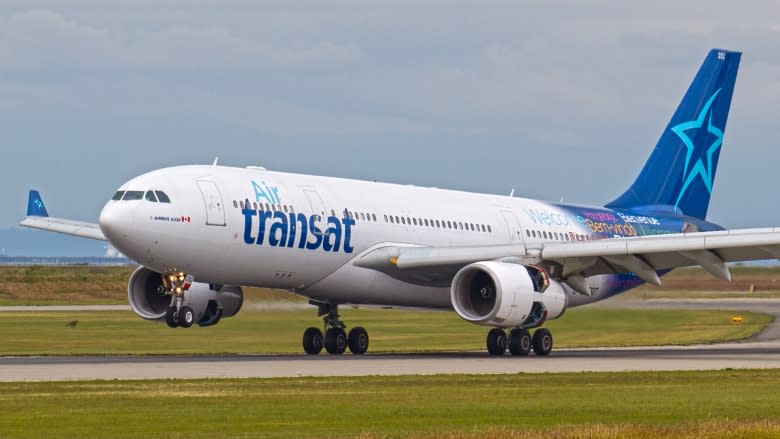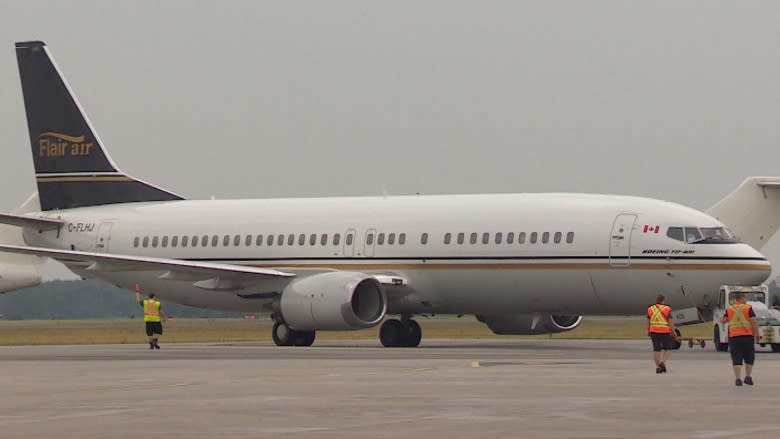The 'Mexican game': How Air Transat misled passengers and aviation officials
Air Transat instructed a Canadian charter airline to mislead aviation authorities and its passengers about unscheduled stops on flights from Mexico, according to sources and a string of emails obtained by CBC News.
The emails should make every air passenger "skeptical about 'unscheduled' refuelling stops," says air passenger rights advocate Gabor Lukacs.
The problems stem from Air Transat needing more planes for its Mexico routes, and then hiring a charter airline that could only complete the route non-stop under ideal or favourable flying conditions.
The complicated saga began in 2016 when Air Transat hired Flair Air, a B.C.-based charter company with a fleet of five older Boeing 737-400s.
The prescribed range of the 737-400 is 4,176 kilometres; the flight distance from Edmonton to Cancun is 4,248 km.
Two of the Flair planes had extra fuel tanks that would enable them to fly a full load of 156 passengers safely between Edmonton and Cancun — at least when flying southbound, say Flair pilots, who spoke on condition of anonymity.
When taking off in colder climates, jets don't use as much fuel, and flying south doesn't go against the prevailing jet stream.
But flying north — with a full complement of passengers and luggage, taking off in a hot climate where it is more difficult to create thrust, and flying against headwinds — requires much more fuel, often more than their planes can carry, the Flair pilots say.
Air Transat's manager of commercial operations was prepared for the planes not being able to make the northbound flight non-stop. In an email to Flair's director of flight operations, Mauricio Diaz gave the following instructions.
"Due to Mexican authorities restrictions, we always need to file a direct flight (flight plans) CUN-YEG [from Cancun to Edmonton]," he wrote in a May 2016 email to Flair.
"Never file CUN-MSY-YEG [Cancun-New Orleans-Edmonton] because it will be refused by [the Mexican authorities]," the email continues. "When the flight is airborne from [Cancun], you can plan the technical stop in [New Orleans] and advise ATC [air traffic control]."
Air Transat spokesperson Debbie Cabana refused to comment about this email.
Passengers misled
Not only were passengers being misled about being on a non-stop flight, Flair's pilots say they were uncomfortable filing two flight plans.
"Problem is, what if you're flying across the Gulf [of Mexico], and you have a communications problem, and you enter American air space, land in Kansas City and nobody knows about it, post 9/11?" one pilot told CBC News, speaking on the condition of anonymity.
"How do you think that is going to end?" he added, suggesting that he could be intercepted by U.S. fighter jets.
"Airlines may divert to a different airport than the destination in their flight plan for a variety of reasons, as long as they are in contact with air traffic control," said U.S. Federal Aviation Administration spokesperson Tammi Jones. "Any aircraft that loses radio contact with air traffic control for an extended amount of time could be intercepted."
Passengers also had their flight times extended by as much as two hours.
The first flight of Flair's contract with Air Transat, on May 22, 2016, diverted to New Orleans. Two subsequent ones on May 29 and June 5 went through Kansas City.
Email spells out 'Mexican game'
An email from Flair's director of flight operations, Harold Knop, makes no mention of passenger dissatisfaction with the stopovers. Instead, he assured pilots that "Transat has advised us that this method has worked successfully and without any issues with previous operators and that there was no negative passenger reaction in these situations."
Knop's instructions — which became known among pilots at Flair as the "Mexican game" — explained that "the passengers will not have been briefed prior to boarding."
"The flight attendant manager has requested that the pilots make the applicable announcement to the passengers at the appropriate time en route in cruise. The announcement should be clear, brief and truthful…"
"'Ladies and gentlemen,'" suggested Knop in the May 2016 email. "'I would like to inform that we will be required to land in New Orleans in order to take on additional fuel for our flight to Edmonton. We will be landing at (xxxx) p.m. We expect to be on the ground for no more than 40 minutes. We apologize for this delay and the inconvenience.' Or something along that line."
Air Transat, in a series of back-and-forths with CBC News over six months, said it told its passengers via their "electronic travel documents" that there would be refuelling stops.
When asked if the airline had told Flair there were no customer complaints when making previously unscheduled stops with other carriers, Cabana, the Air Transat spokesperson, refused to answer.
Passengers not happy
In online travel forums, however, some people claiming to be Air Transat passengers did complain about unexpected stops happening with other Flair flight paths to and from Mexico.
"It was advertised as non-stop from my travel agent," one person wrote about a Flair flight from Kelowna to Cancun this past January. "The crew on board described it as a non-stop and made a point of telling the entire plane they normally made it without the stop.
"The crew said the stopovers were due to headwinds, runway length, and passenger load."
CBC News examined the Cancun-to-Kelowna flights made by Air Transat/Flair this past winter on Flight Stats, an online repository of historic flight data.
On 11 consecutive flights advertised as non-stop — from Jan. 28 to April 8 — all experienced stopovers: two of the flights landed in Winnipeg, eight of them landed in Regina, and one was diverted to Kansas City.
On two of southbound flights from Kelowna — on Jan. 21 and Feb. 18 — the jets stopped in Calgary to top up.
When CBC News again reached out to Cabana on the topic, she said: "Refuelling stops were not planned for any of the other flights, with the exception of the flights from Cancun to Edmonton [in May and June of 2016]. In all the cases, when a scheduled or unscheduled technical stop had to be added, the passengers were informed.
"Mexican authorities were also notified of a change in our flight route. Such situations were relatively rare during the winter season, which just came to an end."
Passenger rights advocate Lukacs called the conduct exposed by the leaked email chain "an abuse of the public's trust."
"It demonstrates lack of oversight and enforcement by the Canadian government," he said.
Authorities respond
Transport Canada said all flight plans must be filed with Nav Canada for air traffic control and management.
Flights "can deviate from the plans but the differences — small or significant — need to be accounted for," said Transport Canada spokesperson Daniel Savoie, citing "weather, mechanical or human factors" as reasons for deviation.
There are no penalties for filing flight plans an airline has no intention of following, he said.
"Airlines should ... make reasonable efforts to inform passengers of any delays, cancellations and schedule changes, and, to the extent possible, the reasons for them," said Martine Maltais, spokesperson for the Canadian Transportation Agency (CTA), an independent regulator that helps resolve travel-related complaints.
Unsatisfied passengers can file a complaint with the CTA against the airline they purchased their ticket from, she added.
Flair referred all route-related questions to Air Transat.
As for the Mexican authorities, they told CBC News there was no reason to file false flight plans: It is not against Mexican regulations to make a technical stop in the U.S., so there was no reason to play the original "Mexican game."
For tips on this or other stories, contact John Nicol or Aaron Saltzman.

 Yahoo Finance
Yahoo Finance 

